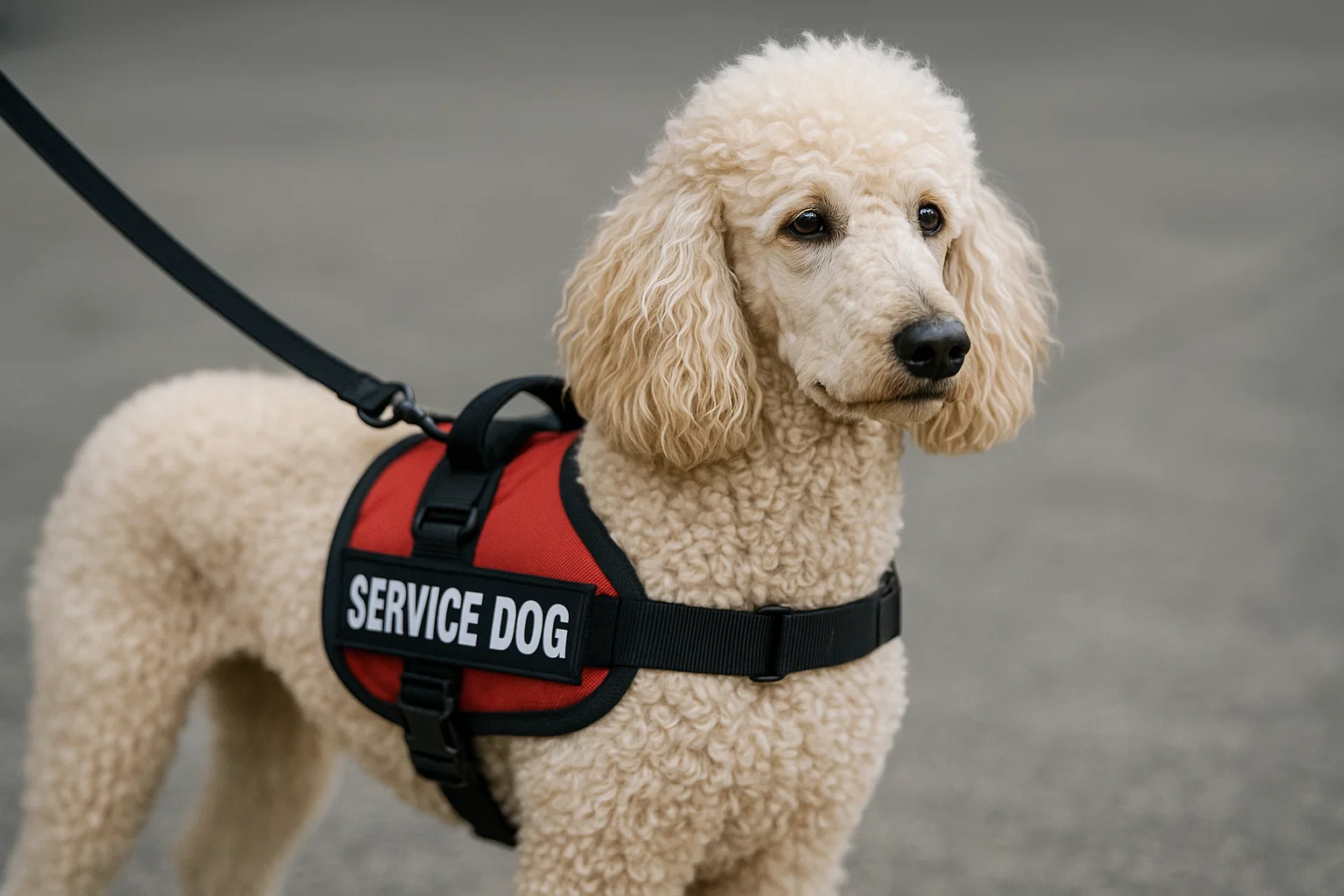Poodle as a Service Dog

The Poodle, a versatile and intelligent breed, has long been cherished as a family companion. However, its potential as a service dog should not be overlooked. In this comprehensive examination, we will explore the qualities that make the Poodle a great candidate for various service roles, its physical and temperamental characteristics, health considerations, and the type of training required.
Poodle Overview
The Poodle is an exceptional canine breed, known not only for its distinctive appearance but also for its outstanding intelligence and trainability. Originating from Germany but developed as a distinct breed in France, Poodles have been traditionally used as water retrievers. Today, they are often seen excelling in competitive dog sports and providing loyal companionship as family pets.
Physical Characteristics
Poodles come in three recognized sizes: Standard, Miniature, and Toy. For service work, the Standard Poodle is most commonly used due to its size, strength, and endurance, which are important for tasks that require physical assistance. However, Miniature Poodles can also be effective in roles that do not require large size or strength, such as certain alert services.
Standard Poodle Characteristics:
- Height: 15 inches and above
- Weight: 40-70 pounds
- Coat: Curly and dense, very low shedding
- Colors: Can be seen in various solid colors including white, black, apricot, and gray
Physical Suitability for Service Work:
- Size & Strength: Ideal for mobility assistance, able to support weight and retrieve objects
- Coat: Hypoallergenic nature suits individuals with allergies, requires regular grooming
- Energy & Stamina: High energy levels suitable for active roles that require long working hours
Temperament and Attitude
Poodles are renowned for their keen intelligence and alert nature, making them highly trainable and responsive to human cues. With a playful yet dignified demeanor, Poodles exhibit both enthusiasm and focus, which are essential traits for service dogs.
Behavioral Traits:
- Highly Intelligent: Rank among the top breeds for intelligence, which translates into quick learning and problem-solving abilities.
- Eager to Please: They are motivated by praise and positive reinforcement, facilitating the learning process.
- Social Nature: Generally friendly and well-mannered, making them suitable for work in varied public environments.
- Adaptability: Adapt well to different living situations and can handle changes in routines
Public and Stress Management:
- Display calmness and confidence in busy or noisy environments
- Capable of managing stress effectively with proper socialization
Types of Service Work
Poodles are versatile, making them suitable for a wide range of service roles. Their adaptability and intelligence allow them to excel in various functions that require both physical and mental engagement.
Potential Service Roles:
- Mobility Assistance: Standard Poodles are strong enough to aid with balance and coordination and can retrieve dropped items.
- Medical Alert: They can be trained to alert to conditions like seizures or changes in blood sugar levels due to their acute sense of smell.
- Autism Assistance: The calming presence of Poodles can provide comfort and companionship to children with autism.
- Psychiatric Support: Poodles can help individuals with PTSD or anxiety by providing emotional support and grounding, their intuition and empathy making them perfect for this role.
Health Considerations
When considering a Poodle for service work, it is essential to be aware of certain breed-specific health concerns that may affect their capacity to perform duties over a long period.
Common Health Issues:
- Hip Dysplasia: A genetic condition that can impact mobility and is important to screen for in service dogs.
- Bloat: A life-threatening condition more common in deep-chested dogs like the Standard Poodle; preventative feeding strategies are necessary.
- Eye Problems: Conditions such as cataracts and progressive retinal atrophy can affect vision.
Health Management:
- Regular veterinary visits and health screenings
- Appropriate diet and exercise to maintain optimal health and reduce the risk of obesity
Training and Suitability
Training plays a pivotal role in shaping a Poodle's aptitude as a service dog. Their intelligence and eagerness to work make Poodles relatively easy to train compared to some other breeds.
Training Characteristics:
- Intelligence: Facilitates the learning of complex tasks and response patterns.
- Focus: Poodles can maintain concentration for extended periods, essential for service roles that require constant vigilance.
- Socialization: Needs early and consistent socialization to ensure they are unfazed by new environments or people.
Training Techniques:
- Positive reinforcement methods work best in motivating Poodles
- Structured training programs that challenge their cognitive abilities
Summary of Poodle
In conclusion, Poodles are capable and impressive candidates for service dog roles due to their intelligence, versatility, and eagerness to please:
- Strengths:
- Exceptional trainability and intelligence
- Adaptable to different service roles
- Hypoallergenic coats make them suitable for individuals with allergies
- Potential Challenges:
- Grooming needs require regular maintenance
- Prone to specific health issues that need management
- Ideal Service Roles:
- Mobility assistance
- Medical alert services
- Psychiatric and emotional support
As a result, Poodles can be an excellent choice for someone seeking a service dog, especially with the proper health care, training, and grooming practices in place.











